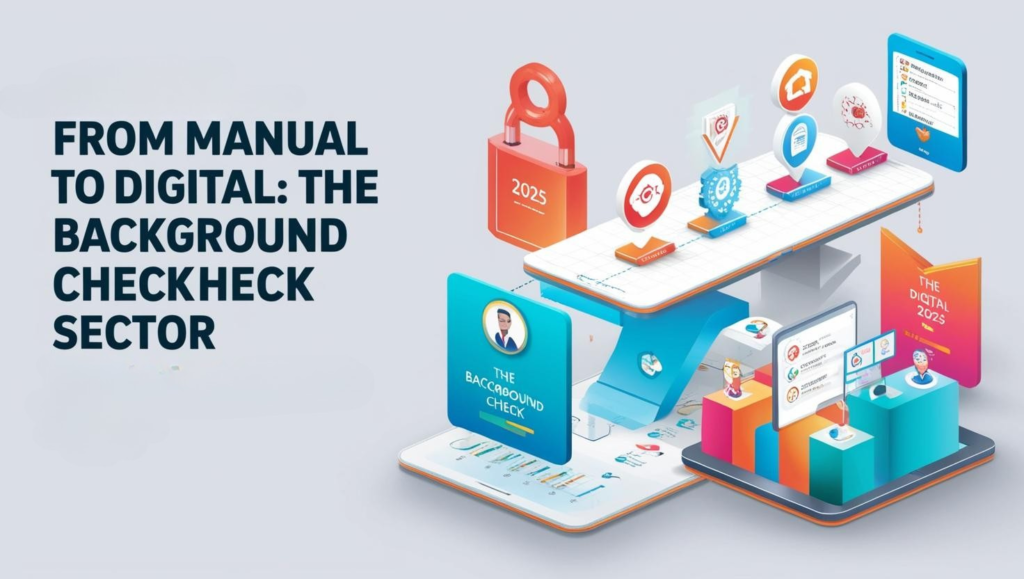The way businesses approach background checks has undergone a dramatic transformation over the years. What started as a tedious manual process has evolved into a streamlined digital operation, thanks to advancements in technology. In 2025, industries like HR, IT, banking, and those undergoing digital transformation are reaping the benefits of this shift. If you’re navigating this space, understanding the evolution of background checks is crucial for staying competitive.
The Early Days: Manual Background Checks
Before the dawn of technology, background checks were a manual process. This involved
Paperwork and Physical Verification: Employers used stacks of paper forms, and verification teams had to contact educational institutions, previous employers, and legal offices manually.
It took weeks even months to clear a single check and thus to take the hiring decision.
Less Precise: Manual error and some partial information used while creating these reports.
While it is true that the procedure of manual one has laid its ground, yet it took so much of time and more often than not it was faulty too, thus required innovation to replace it.
Digital Background Checks

The digital revolution has brought about tools and technologies that have shaped background verification in a new form. Here is how the transformation took place:
1. Automated Systems with Integration of AI
Automated systems can perform background verification, check criminal records, and verify work history.
The AI algorithms are able to pick out anomalies, flagging potential risks while eliminating human error for a better result.
2. Cloud-Based Platforms
Cloud technology can be accessed anywhere in the world in real time for verification data.
It makes it possible for HR teams, candidates, and verification agencies to work faster.
3. Global Databases
There is now international access to databases on criminal records, education credentials, and identity verification for employers.
This is more crucial for the IT and banking industries, which tend to hire across borders.
Role of Technology in 2025’s Digital Background Checks
In 2025, digital background checks are smarter, faster, and more reliable, courtesy of cutting-edge technologies:
1. Artificial Intelligence and Machine Learning
AI tools :
Analyzing big volumes of data for patterns and anomalies.
It provides predictive insights, such as a candidate’s probability of staying with the company.
Improves verification accuracy continuously through machine learning.
2. Blockchain Technology
Blockchain offers:
Immutable records for safe and transparent background checks.
Fewer chances of fraud since records cannot be altered after they are appended to the blockchain.
Cross border verification will be faster as multinationals will require it.
3. Digital Identity Verification
Digital identity verification tools including;
Biometric authentication;
Video-based identity verification;
Facilitates real-time confirmation of identities.
It ensures that it eliminates in-person verification and makes the process more convenient for the users.
4. Compliance Automation
Digital tools automatically ensure compliance with global and local regulations, such as GDPR, FCRA, and India’s Data Protection Bill. They:
Produce audit trails for transparency.
Notify employers about potential non-compliance risks.
Advantages of Digital Background Checks
Switching from manual to digital background checks provides many benefits:
Speed: Automated processes drastically reduce verification timelines.
Accuracy: AI-driven tools minimize errors and provide reliable data.
Scalability: Digital platforms can handle large volumes of verifications, ideal for growing businesses.
Cost Effective: Automated services significantly reduce the employment of huge numbers of people thus saving overall expenses.
Candidate Satisfaction: Quicker, more transparent vetting ensures improved satisfaction by job applicants over the recruitment process
Challenges Confronting Online Background Check Services
However effective digital may prove, there are pitfalls associated with such changes:
Securing Information: Employers need to ensure candidate sensitive information is protected against unauthorized access or exploitation.
Lack of acceptance: Smaller firms are either priced out by or lack expertise to accept technological enhancements.
Complexities in Regulations: A multinational firm will face divergent regulations across different geographies.
How Businesses Can Adapt to the Digital World
In order to undertake a digital background check, it is recommended the following:
1. The Right Tools
Select a platform that can offer integration with AI, real-time reporting, and automation of compliance. Ensure they scale up well to meet future needs.
2. Train Your Teams
Equip the HR and compliance teams with the knowledge of effective use of digital tools. Ongoing training ensures that it is adopted seamlessly and maximizes ROI.
3. Data Security
Employ high-end cybersecurity measures in safeguarding confidential candidate information. Use verification providers that maintain strict security standards.
4. Monitor and Evaluate
Be always on the lookout for improvement of your background verification processes. Take advantage of analytics to measure the efficiency and accuracy.
The Future of Background Checks
As we step forward, background verification is going to transform with these factors:
Hyper-Automation: AI, machine learning, and robotics combined for even speedier and accurate checks.
Decentralized Systems: Wider use of blockchain for safe and decentralized verification.
Personalized Checks: Customized verification based on the needs of the roles.
Conclusion
The background checks have changed from a manual process to a digital process, and this has completely changed the way industries such as HR, IT, and banking conduct their operations. For companies in rapid growth and globalization, 2025 is the year of digital transformation-not a choice, but a necessity.
